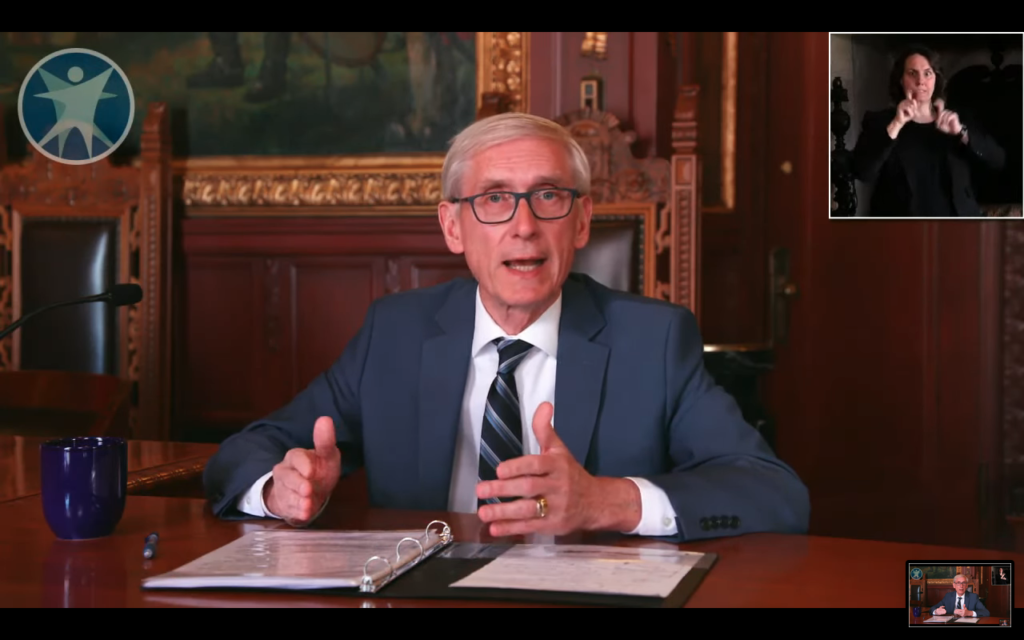Gov. Tony Evers’ administration on Tuesday asked the Wisconsin Supreme Court to throw out a challenge to its safer-at-home order.
In a response to a challenge filed by Republican lawmakers last week, Department of Justice lawyers wrote that at least 42 other states have issued similar orders.
They said Evers’ order averted a predicted surge in cases and has positioned the state to soon lift restrictions.
“The petitioners’ arguments should be rejected,” the administration’s attorneys wrote. “They posit a fundamental reworking of how Wisconsin responds to a pandemic—in the midst of one—that is incompatible with the statutes, constitutional principles and on-the-ground reality.”
The lawyers noted state laws give DHS the authority to pursue its actions. And they warned that lifting the order prematurely could lead to a sharp increase in hospitalizations.
Peak hospitalizations could exceed 25,000 during the summer, exceeding the state’s capacity, according to the response, which cited testimony from DHS Deputy Secretary Julie Willems Van Djik and Dr. Ryan Westergaard, chief medical officer and state epidemiologist for communicable diseases at the agency.
The brief also criticized the process proposed by Republicans, arguing it would hamstring a quick response to a pandemic situation by going through an emergency rulemaking process.
“Deadly viruses don’t wait around while bureaucrats and politicians jump through procedural hoops,” Evers said in a statement. “An effective response requires swift action by public health experts, which is why state law gives DHS the power to act quickly to stop the pandemic and save lives.”
Republican lawmakers asked the court last week to block the extension of Evers’ safer-at-home order and stay its order for six days to give DHS time to develop a new plan subject to legislative review. They have until Thursday afternoon to respond to Tuesday’s filing.
At a Metropolitan Milwaukee Association of Commerce webinar Tuesday, Senate Majority Leader Scott Fitzgerald, R-Juneau, said state laws giving Evers the ability to declare a public health emergency were warranted.
But he was “surprised to find out” that state law allowed DHS Secretary-designee Andrea Palm to make “unilateral decisions.”
“For us, it’s become black and white,” Fitzgerald said. “We’re asking the court to kind of give us guidance on exactly how far and how long and what the breadth of what’s been granted to the secretary in making decisions and at what point should the Legislature, being the branch of government closest to the people, when should we be consulted?”
Assembly Speaker Robin Vos, R-Rochester, said they took “flack” from their own party because Fitzgerald and he gave leeway to Evers in the first weeks of the pandemic.
“As I look at my colleagues in other states, they have just been much more involved in the decision-making process, not making the decision per se, but offering a different perspective,” he said.
Vos and Fitzgerald back a regional approach to lifting the safer-at-home order, while Evers is focused on a statewide approach.
The court on Tuesday accepted a brief filed by Legal Action of Wisconsin asking it to dismiss the Legislature’s lawsuit.
It also accepted a brief filed by the Independent Business Association of Wisconsin, a Pleasant Prairie automobile repair shop and a Grafton hair salon in support of the Legislature.
The court rejected a motion to intervene in the lawsuit by Milwaukee Teachers’ Education Association, Madison Teachers Inc., SEIU Healthcare Wisconsin and Amalgamated Transit Union Local 998.
Wisconsin Health News is removing the password on all stories related to the coronavirus. For the latest developments follow us on Twitter at @wihealthnews or check out our website. For complete healthcare coverage, sign up for a free trial to our daily email newsletter.
